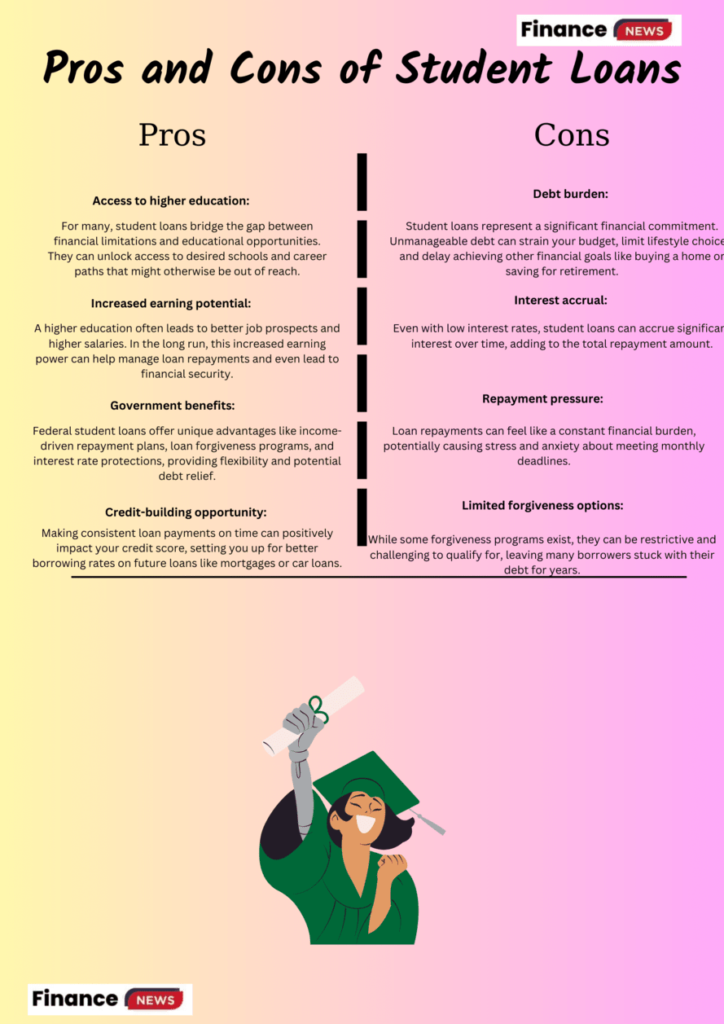
Yes, in the USA, student loans can be worth it for many individuals, as they facilitate access to higher education and can lead to increased earning potential in the future.
Deciding whether a student loan is the right path for your education journey can be a daunting task. To help you navigate the maze of financial aid, let’s tackle some of the most frequently asked questions:
Is Student Loan Worth it?
This depends entirely on your specific circumstances. Consider:
- Future earning potential: Will your chosen field offer a salary high enough to comfortably manage loan repayments?
- Loan amount and interest rates: Can you manage the monthly payments without excessive strain on your future finances?
- Alternative options: Have you explored scholarships, grants, and work-study programs to minimize borrowing?
Ultimately, it’s a personal decision. Weigh the benefits of your desired education against the long-term financial commitment of a loan.
Read More: What’s The Role of a Stockbroker in Trading?
What is a student loan?
A student loan is a type of financial aid specifically designed to help cover the costs of post-secondary education, like tuition, fees, and living expenses. It’s borrowed money that you repay with interest over a set period after graduation.
How much is a student loan?
There’s no one-size-fits-all answer, as the amount depends on several factors:
- Your education level: Undergraduate loans typically have lower limits than graduate or professional loans.
- School costs: Your specific school’s tuition, fees, and living expenses play a significant role.
- Financial aid awarded: Grants and scholarships received will reduce your borrowing need.
Remember, it’s crucial to borrow only what you absolutely need and avoid overborrowing.
Is student loan interest monthly?
Yes, interest on student loans typically accrues monthly, even while you’re in school. However, for federal subsidized loans, the government covers the interest while you’re enrolled at least half-time, preventing it from piling up during your studies.
How long does it take to pay off a student loan?
Repayment terms vary depending on the loan type and amount. Standard 10-year repayment plans are common, but longer or shorter terms might be available. Remember, the longer the repayment period, the more total interest you’ll pay.
Are student loans ever worth it?
For many, a student loan can be a valuable tool to access higher education and pursue their career goals. The investment in their future earning potential can outweigh the financial burden if managed responsibly. However, it’s crucial to carefully consider the long-term implications before borrowing.
Read More: Is stock Market easy to learn?
Can I get my student loans forgiven?
Certain federal student loan forgiveness programs exist for specific professions or situations, such as public service work or teacher careers. It’s essential to research programs specific to your circumstances and eligibility.
Should I take out student loans?
This is a complex question with no simple answer. Thoroughly research your options, compare loan terms, and explore alternative financial aid before making a decision. Remember, responsible borrowing and careful planning are key to navigating the world of student loans.
Pros and Cons of Student Loans: Weighing the Benefits and Drawbacks

Deciding whether to take out student loans requires a delicate balancing act. Here’s a breakdown of the potential advantages and disadvantages to help you make an informed decision:
Pros:
- Access to higher education: For many, student loans bridge the gap between financial limitations and educational opportunities. They can unlock access to desired schools and career paths that might otherwise be out of reach.
- Increased earning potential: A higher education often leads to better job prospects and higher salaries. In the long run, this increased earning power can help manage loan repayments and even lead to financial security.
- Government benefits: Federal student loans offer unique advantages like income-driven repayment plans, loan forgiveness programs, and interest rate protections, providing flexibility and potential debt relief.
- Credit-building opportunity: Making consistent loan payments on time can positively impact your credit score, setting you up for better borrowing rates on future loans like mortgages or car loans.
Cons:
- Debt burden: Student loans represent a significant financial commitment. Unmanageable debt can strain your budget, limit lifestyle choices, and delay achieving other financial goals like buying a home or saving for retirement.
- Interest accrual: Even with low interest rates, student loans can accrue significant interest over time, adding to the total repayment amount.
- Repayment pressure: Loan repayments can feel like a constant financial burden, potentially causing stress and anxiety about meeting monthly deadlines.
- Limited forgiveness options: While some forgiveness programs exist, they can be restrictive and challenging to qualify for, leaving many borrowers stuck with their debt for years.
- Career uncertainty: Not all degrees guarantee high-paying jobs. If your chosen field doesn’t provide sufficient income, struggling with repayment can become a long-term issue.
Bottom line
Student loans can open doors to education and career opportunities, but they add debt and financial pressure. Carefully weigh the pros and cons before borrowing, only take what you need, and plan for responsible repayment. Remember, it’s your future, your choice.
✓ Jumbo vs. Conventional Loans











